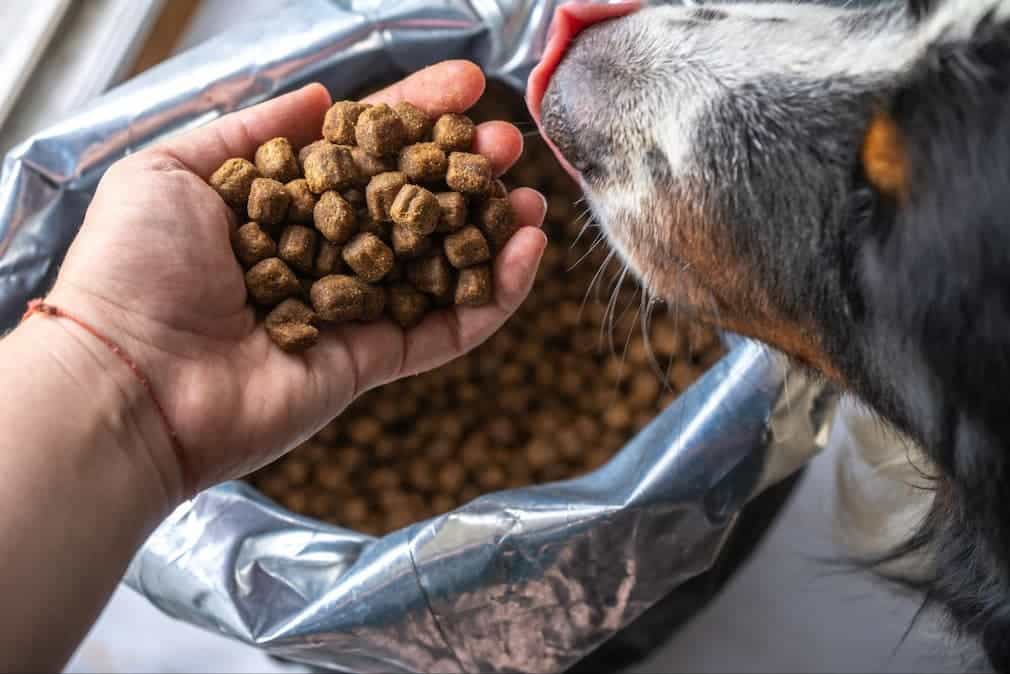I am reading conflicting information about when to transfer our puppy from puppy food to adult dog food. Our vet says anytime between 6 and 18 months for our type of dog (Basset Hound). The dog food guide says 12 months, the 30-year pet store owner says six months, and our backup vet says 12 months at the longest. My gut instinct says because a Basset’s bone structure is not fully developed until about 18 months old, keep her on puppy food until she’s 18 months. Still, she’s not interested in her puppy food anymore and, as of late, goes several days without eating. When she does eat, it’s only about a cup and a half. She’s exuberant and playful and drinks plenty of water, so I am not sure what is left other than maybe she is ready for adult dog food.
-Tish Beavens
Cesar Millan’s Answer:
Hi Tish,
This is one of the most common questions I get from puppy owners. There is a lot of conflicting information that makes it very hard for pet owners to know which guidelines to trust. Making the transition from puppy to adult food at an appropriate time is important because there is a major shift regarding your puppy’s caloric needs and nutrition requirements as she approaches maturity. Puppy food is very high in calories and nutritional supplements, so feeding it too long to a mature dog can result in obesity and orthopedic problems.
In general, you want to change to adult food when your puppy is approaching her adult height. The problem is that different breeds mature at different rates due to the wide variation between breeds. A rule of thumb to remember is that smaller breeds tend to develop faster than large breeds. Small breed dogs up to 30 pounds mature around 10 to 12 months of age, keeping in mind that some toy breeds can mature even earlier. Medium-breed dogs up to 80 pounds grow between 12 to 16 months, and your Basset hound falls in this category. Large and giant breed dogs weighing more than 80 pounds can take up to two years to reach full maturity.
These are guidelines only; as you may have noticed, they can differ from other policies. So which approach is the best to follow? Should you follow the vet, the pet store owner, or the dog food companies? The best guideline to follow is your puppy’s! In your case, she is already rejecting the puppy food and showing a preference for adult food. The puppy food likely has too many calories for her, so she feels less of a need to eat when she is on the puppy food. You did not state her age, but as long as you are within the general guidelines, it is safe to transition to adult food.
One final tip for puppy owners about changing food is to do it gradually. Mix in increasing amounts of adult food with the puppy food over a week while decreasing the quantity. By the end of the week, you should only be feeding the adult food. Making the change gradual makes it less likely that your dog will experience loose stools and upset stomachs.
Stay calm and assertive!
-Cesar Millan

When to Switch from Puppy Food to Adult Food
As your furry friend grows older, their nutritional needs change too. Puppies have different dietary requirements than adult dogs, and it’s essential to transition from puppy food to adult food. Switching too quickly can cause digestive problems and discomfort for your pup. It’s recommended to start the transition when your puppy is around 12 months old or has reached adult size. Always consult your veterinarian for advice on the best adult food for your dog’s specific needs.
Understanding the Nutritional Needs of Adult Dogs
As dogs age, their nutritional needs change, just like humans. Adult dogs require a balanced diet with the nutrients necessary to maintain their health and well-being. Protein, carbohydrates, fats, vitamins, and minerals are essential to a healthy dog’s diet. Feeding your adult dog food specifically formulated for its age, breed, and size is critical. By understanding the nutritional needs of adult dogs, you can ensure that your furry companion remains healthy and happy for years to come.
Protein Requirements and Sources
Dogs require essential amino acids found in protein to thrive, despite not being carnivores. However, according to some veterinarians, high amounts of protein may not be recommended for dogs with kidney disease or senior dogs. It’s best to consult with your vet to ensure your dog receives proper nutrition. Instead of focusing on protein quantity, prioritize protein quality in your dog’s diet.
It is vital to ensure that your dog’s diet contains sufficient protein, as it plays a crucial role in providing energy and developing strong muscles, bones, and joints. Feeding too little protein can be detrimental to your pup’s health.
Some protein sources for your pup are chicken, turkey, duck, pork, beef, and fish.
Fat Requirements and Sources
Dogs primarily rely on fat, rather than carbohydrates, as their primary energy source during rest and various forms of exercise. Different ingredients provide varying amounts of fatty acids. Animal sources like chicken fat and beef fat contain triglycerides and arachidonic acid. Fish oil, purified algal oil, and flaxseed oil are sources of omega-3 fatty acids. On the other hand, corn oil, soybean oil, sunflower oil, and canola oil are primary sources of omega-6 fatty acids.
Carbohydrate Requirements and Sources
Carbohydrates play a crucial role in a dog’s diet, providing energy in the form of glucose and serving as a primary source of dietary fiber. Without adequate carbohydrate intake, the body will resort to breaking down amino acids from other bodily processes to obtain glucose. Some great sources of carbs are:
- Potato
- Sweet Potato
- Brown Rice
- Oats
- Pearled Barley
- Millet
- Whole Wheat
Vitamins and Minerals Essential for Adult Dogs
Commercial dog food labeled as “complete and balanced” is formulated to provide all the essential vitamins, minerals, and nutrients your dog requires for a healthy diet. These diets are an excellent source of vitamins for your furry friend. Pet food formulated for different life stages, such as puppies, adults, and seniors, is nutritionally balanced with varying levels of essential vitamins to meet the unique needs of each step.
Dogs on a commercial diet usually don’t need vitamin supplements unless advised by a veterinarian. However, homemade diets may require supplements to ensure adequate vitamin intake. If you are wondering whether or not to give your furry friend supplements, have a conversation with your veterinarian.
Understanding the Role of Water in a Dog’s Diet
Water is essential for dogs to stay hydrated and helps digest and absorb nutrients. It is recommended that canines drink one ounce of water per every pound of body weight. Though it is not necessary to measure how much water they consume, ensure their water bowl is always full of fresh water.

Choosing the Right Type of Adult Food
Choosing the correct type of adult dog food is crucial for the health and well-being of your furry friend. The food you choose should be based on your dog’s age, breed, size, activity level, and any health conditions they may have. It’s essential to read the ingredients list and choose a high-quality food that provides all the necessary nutrients for your dog’s specific needs. Consulting with your veterinarian can also help determine the best type of adult dog food for your pet. Remember, a healthy diet is one of the essential factors in ensuring a long and happy life for your furry companion.
Consider Dog’s Breed
Breed-specific dog foods are sometimes a marketing ploy and lack nutritional science to support them. Research has not determined the specific dietary requirements for different breeds of dogs. While a small breed dog’s metabolism differs from a large breed dog’s, it is unlikely that a Yorkie’s dietary needs vary significantly from a Shih Tzu’s. Targeted nutrition has advantages, but science still needs to narrow it down to breed. However, there are a few exceptional cases where breed-specific dog food may be beneficial.
Consider the Dogs Size
One important factor to consider when selecting dog food is the size of your dog. Small dogs have different nutritional needs than large dogs, and their food should reflect this. Smaller dogs require more calories per pound of body weight than larger dogs, and their food should be higher in protein and fat. Additionally, small dogs may have smaller mouths and teeth, so their food should be smaller and easier to chew.
Monitoring Your Dog’s Health
As a pet owner, you have a front-row seat to how your furry friend responds to your selected food. If your dog’s stool is firm, healthy, active, and fit, their dog food will likely work well. If you have concerns, keep a daily log and be prepared to make necessary changes.
Adjust Diet Accordingly
If your pup has been diagnosed with allergies, stomach issues, or other dietary restrictions, consulting your veterinarian is the first step in selecting the best adult food to transition to.
Make Minimal Changes
When making dietary changes, sometimes it is better to gradually implement the new food. If offering a meal twice a day, try replacing one of the meals with the new option. If you’re going from wet to dry food, try adding some dry kibble a little at a time until you’ve transitioned away from the canned option.
Tips for Introducing Adult Food to Your Pet
Transitioning your puppy to adult food can be tricky if not done correctly. It’s important to slowly introduce the new food to avoid digestive issues such as diarrhea or vomiting.
Gradually Transitioning to New Food
Avoid upsetting your dog’s digestive system by introducing new food gradually. This process should take 5-7 days. Mix increasing amounts of the new food with your dog’s current food to help them adjust.
Dogs with sensitive stomachs, food allergies, or gastrointestinal issues may require a more extended transition period when changing their diet. It is essential to monitor your dog’s response during this process.
Mix in Wet or Fresh Food
If your puppy has been eating canned food and you plan to transition to dry kibble, we recommend mixing a small amount of the dry food into the wet mixture, slowly increasing the dry amount and decreasing the wet. As stated before, doing this will help your furry friend to adjust accordingly without hurting their bellies.
Adding Flavor Booster
If you have a picky eater, try a flavor booster on top of the dry kibble. There are both wet and dry flavor toppers to choose from, and the one you decide to use will significantly depend on what you and your pet prefer. Be prepared to try out a few different kinds until you find one your pet loves.
Common Mistakes to Avoid When Switching to Adult Food
When you look at the pet food aisle, the choices can be overwhelming sometimes, and switching your puppy to adult food can be tricky. There are several common mistakes that pet owners make.
Choosing Food with Low-Quality Ingredients
There is a difference between different brands of dog food and the ingredients they contain. A high-quality label will include vegetables, meat, and sometimes fruit. On the other hand, low-quality dog foods often use meat byproducts and grains as fillers. Also, be vigilant in checking for harmful ingredients such as artificial preservatives and sodium nitrates.
Not Checking the Label for Nutrition Information
Label regulations require pet food companies to make it visible on their products. Check the label for the following:
- Product name and brand
- Species the food is intended for
- The quantity within the bag
- Nutritional adequacy statement
- List of ingredients
- Guaranteed Analysis
- Directions on how to feed
- Manufacturer name and address
Overlooking Food Sensitivities and Allergies
Just as you wouldn’t eat something your digestive system doesn’t like, considering your pet’s allergies and sensitivities is essential for the well-being of your dog.
Not Consulting with a Veterinarian
Your pet care provider is an excellent source of knowledge and knows your pet’s specific dietary and health needs. Before you make the official switch to adult food, please consult with your veterinarian to get their opinion. A veterinarian can guide a dietary plan tailored to your dog’s specific health or genetic concerns.











